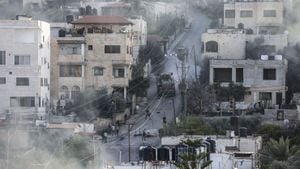South Korea is embroiled in intense political turmoil as President Yoon Suk Yeol faces impeachment proceedings linked to allegations of insurrection stemming from his controversial declaration of martial law on December 3, 2024. The shocking developments have left the nation questioning the integrity of its democratic processes, as key political figures and institutions grapple with the fallout.
Details surrounding the martial law declaration indicate serious consequences. Reports suggest Yoon ordered the arrest of several political figures, including National Assembly Speaker Woo Won-shik and leaders from both the ruling and opposition parties. Allegations gained traction following the emergence of notes from Roh Sang-won, former chief of the Defense Intelligence Command, which detailed plans to detain specific individuals, including religious leaders and influential politicians. According to MBC, these notes identified various targets as subjects to be collected during the tense period of martial law.
Police officials at the National Office of Investigation confirmed the existence of these notes, which not only implicated politicians and media members but also hinted at provocations aimed at inducing North Korean aggression near the Northern Limit Line. Roh, under criminal investigation, has denied accusations linking him to Yoon's purported orders.
Testimony from military leaders during the impeachment hearings has painted a grim picture of the circumstances surrounding the martial law declaration. Former Defense Security Command commander Yeo-hyung, who has been indicted on charges related to the civil war, vehemently denied any plotting involved in the instatement of the emergency measure. "I have no reason or motivation to plot or prepare martial law," Yeo insisted during his court appearance, emphasizing his opposition to such measures based on deeply held beliefs.
Yet, the court's inquiries have raised doubt about his claims of ignorance, noting he had sufficient foreknowledge of the illegalities surrounding the martial law. The prosecution posits evidence contradicts Yeo's statements, pointing to orders made during the chaotic declaration and subsequent actions taken under those pretexts.
Simultaneously, discussions are underway among leading political parties to address significant national legislative agendas. An agreement has been reached to hold a four-way meeting early next week, which includes key figures from both the ruling and opposition parties, as well as Acting President Choi Sang-mok. The discussions aim to bring clarity to pressing legislative matters, such as the Special Act on Semiconductors and pension reforms.
Jin Sung-joon, chairman of the Democratic Party's policy committee, highlighted the urgent need for these political factions to unite and negotiate effectively. While bipartisan cooperation has traditionally been fraught with hurdles, the recent political climate has sparked hopes for reconciliation and productive dialogue. Park Chan-dae, another Democratic leader, reiterated their commitment to passing the Special Act on Semiconductors during the upcoming legislative session.
Despite differences on contentious issues like workweek regulations and budget adjustments, the willingness to engage suggests potential shifts are on the horizon. Choi Sang-mok has emphasized the necessity for swift decision-making to pass major economic bills to address the growing concerns of the South Korean economy amid global uncertainties.
Moving forward, the unresolved tensions around President Yoon's administration continue to loom large over these negotiations. With his impeachment trial set to examine the validity of the charges against him, each twist and turn promises to shape South Korea's political stability and public trust for years to come. The coming weeks could prove pivotal as the nation seeks to navigate this complex and fraught political arena.



